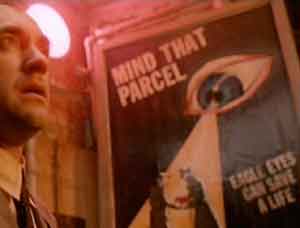A reoccurring theme in the films
viewed so far has been about governmental bodies abusing their power, as it has
been referenced by several of our films, such as Brazil, Metropolis, and now Star
Trek: Insurrection, by taking advantage of our archaic fear of those in
power running wild. As with most of the others, the implications of this
intrusion are unclear, initially it is Picard acting on behalf of the
federation who spies and intrudes on the peaceful Bak’u people taking their “hostages”
back from them. Where could they have gotten the idea of a government acting on
behalf of its own interest and starting a war the people truly aren’t behind? Because
they obviously didn’t provoke it, other than through their tree hugging, energy
saving practices of course. The shadowy figures behind this are made clear from
the beginning due to the dimly light, ominous settings they are found in. This
is in stark contrast to the brightly lit (enlightened?) scenes in which Picard and
his crew come to consciousness as to the reason for their visit. All the while
being monitored by the shadowy figures who themselves are simply dummy
figureheads for an even more veiled leadership.

The actions of the shadowy leadership behind the Son’u
reminded me of theories of ultra-governmental powers actually controlling and
puppeteering the rest of the world. They are willing to stop at no ends for
this invaluable resource they have underneath them; willing to go so far as
sabotage Picard’s team and try to eliminate them and the threat of their
knowledge spreading. Their knowledge was not that the energy source had been found,
because as we know people who return with vital resources are rewarded with
large sums of money, but that force on innocents would be used to get it. And
as history as told us, those who return with resources tend to be handsomely
rewarded, but those who return with resources with the public knowing of the “methods”
in which they were obtained are often.. handsomely rewarded as well actually..
 |
| And then they... |
 |
| Turned him literally into Gold |
All too
often the slogan of doing this for the greater good is used as justification,
it’s an archaic concept that is finding greater meaning as our needs have grown.
Similar to our last film, Brazil, the
use of propaganda by those in power is used, but unlike in Brazil where the end result was inaction, in the action packed Trek
World it was used as a tool for rallying the consciously blind soldiers. In
general the dystopic end depicted in Star
Trek Insurrection followed similar elemental guidelines as previous movies,
such as Metropolis, through our fear
of being manipulated by the powerful that potentially we are in fact the guinea
pigs of something larger. In Star Trek
it was the Enterprise for the perverted Federation to attain the energy source
to power life, and in Metropolis it
was to keep in place their labor energy source that drove life. Yet, sadly, the
least relatable part of Star Trek’s journey was the end result; which is
interestingly in contrast to the 1920’s resolution to this dilemma in Metropolis, which ended in the laboring
class returning inexplicably satisfied. But
all too often we don’t hear stories of those in the Enterprises position taking
the moral road and winning, and they are left to our imaginations as stories.


